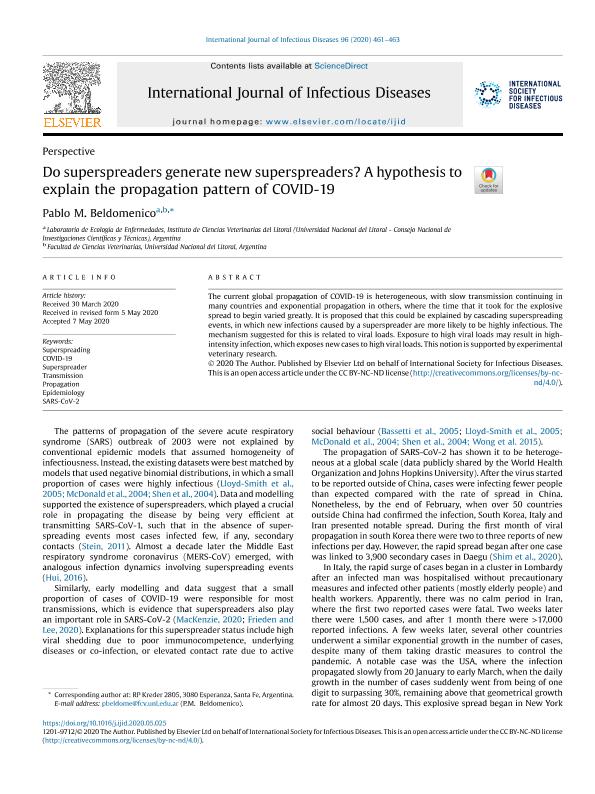Mostrar el registro sencillo del ítem
dc.contributor.author
Beldomenico, Pablo Martín

dc.date.available
2020-06-19T14:10:06Z
dc.date.issued
2020-07
dc.identifier.citation
Beldomenico, Pablo Martín; Do superspreaders generate new superspreaders?: A hypothesis to explain the propagation pattern of COVID-19; Elsevier; International Journal of Infectious Diseases; 96; 7-2020; 461-463
dc.identifier.issn
1201-9712
dc.identifier.uri
http://hdl.handle.net/11336/107693
dc.description.abstract
The current global propagation of COVID-19 is heterogeneous, with slow transmission continuing in many countries and exponential propagation in others, where the time that it took for the explosive spread to begin varied greatly. It is proposed that this could be explained by cascading superspreading events, in which new infections caused by a superspreader are more likely to be highly infectious. The mechanism suggested for this is related to viral loads. Exposure to high viral loads may result in high-intensity infection, which exposes new cases to high viral loads. This notion is supported by experimental veterinary research.
dc.format
application/pdf
dc.language.iso
eng
dc.publisher
Elsevier

dc.rights
info:eu-repo/semantics/openAccess
dc.rights.uri
https://creativecommons.org/licenses/by-nc-nd/2.5/ar/
dc.subject
SUPERSPREADERS
dc.subject
SUPERPROPAGADORES
dc.subject
SUPERSPREADING EVENTS
dc.subject
COVID-19
dc.subject.classification
Epidemiología

dc.subject.classification
Ciencias de la Salud

dc.subject.classification
CIENCIAS MÉDICAS Y DE LA SALUD

dc.title
Do superspreaders generate new superspreaders?: A hypothesis to explain the propagation pattern of COVID-19
dc.type
info:eu-repo/semantics/article
dc.type
info:ar-repo/semantics/artículo
dc.type
info:eu-repo/semantics/publishedVersion
dc.date.updated
2020-06-19T13:20:44Z
dc.journal.volume
96
dc.journal.pagination
461-463
dc.journal.pais
Países Bajos

dc.journal.ciudad
Amsterdam
dc.description.fil
Fil: Beldomenico, Pablo Martín. Consejo Nacional de Investigaciones Científicas y Técnicas. Centro Científico Tecnológico - CONICET - Santa Fe. Instituto de Ciencias Veterinarias del Litoral; Argentina. Laboratorio de Ecología de Enfermedades; Argentina
dc.journal.title
International Journal of Infectious Diseases

dc.relation.alternativeid
info:eu-repo/semantics/altIdentifier/doi/http://dx.doi.org/10.1016/j.ijid.2020.05.025
dc.relation.alternativeid
info:eu-repo/semantics/altIdentifier/url/https://www.sciencedirect.com/science/article/pii/S1201971220303325
dc.relation.alternativeid
info:eu-repo/semantics/altIdentifier/url/https://www.ncbi.nlm.nih.gov/pmc/articles/PMC7211669/
Archivos asociados
